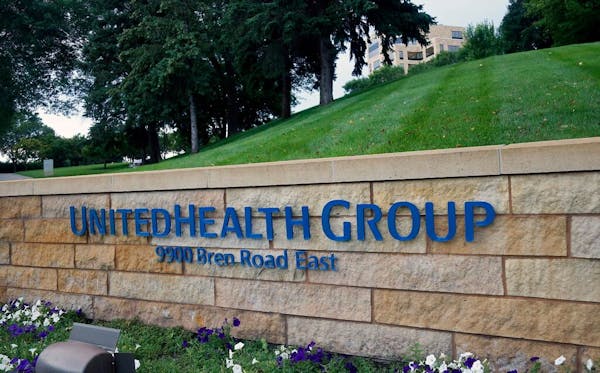Emily Benson can see UnitedHealth Group's headquarters from her office in Edina, but this close proximity hasn't made it easy for her clinic to find emergency funding from the company.
Benson's mental health practice submits bills through a UnitedHealth Group subsidiary that shut down its systems more than three weeks ago because of a cyberattack.
That's left Benson and eight other therapists at Beginnings and Beyond Counseling with basically no revenue and reliant on a $40,000 loan she took out early this month from UnitedHealth.
She resorted to this financing, which includes a $780 fee, because the company's initial no-fee assistance program following the hack offered just $1,100 per week — a small fraction of the clinic's claims total.
"They're offering us money, but it's such an insubstantial amount — such an unhelpful amount," Benson said, while stressing that she values her relationship with both UnitedHealth and its beneficiaries. "I want to be honest about how much we're struggling."
Beginnings and Beyond is one of three Minnesota health care providers that told the Star Tribune this week they haven't been able to use UnitedHealth's financial aid programs to fully bridge a cash crunch that's hitting thousands of hospitals and clinics across the country.
The cyberattack targeted Change Healthcare, a UnitedHealth subsidiary that runs a widely used clearinghouse for electronic claims data that processes 15 billion health care transactions annually and is involved in one out of every three patient records in the U.S. UnitedHealth Group is cooperating with a federal investigation into the cyberattack while scrambling to restore Change Healthcare systems that it shut down to contain the threat.
By week's end, there were some signs of improvement for providers seeking financial help after the Star Tribune contacted Minnetonka-based UnitedHealth about all three situations.
For two small independent clinics in the Twin Cities, a UnitedHealth temporary assistance program launched March 1 evaluated need based on an assessment of historical claims that was far from complete. As a result, the clinics regarded the sums offered as paltry — a mismatch that has been reported in recent weeks by other health care providers in Minnesota and across the country.
After hearing stories like this, "we didn't even bother to apply," said Gretchen Moen, clinical director at Dakota Child and Family Clinic in Burnsville.
Late last week, UnitedHealth launched a new "last-resort" funding program that's designed to provide more help, particularly for small and regional health care providers.
"We are currently engaged with several thousand provider organizations to help them with their cash flow challenges, from large regional health systems to small, rural independent physician practices," UnitedHealth said Friday in a statement to the Star Tribune.
At Robbinsdale-based North Memorial Health, where hundreds of millions of dollars in claims are in limbo, negotiations over financial assistance have been ongoing.
"The amounts offered ... have been insufficient to resume normal cashflow operations," the health system said in a Tuesday statement.
On Thursday, North Memorial added: "The conversations are fluid; we are hopeful for short-term, temporary resolution in the days ahead."
The frustrations voiced publicly by some small clinics, and privately by some large health systems, reflect UnitedHealth's challenge of quickly standing up assistance programs for the subset of health care providers that have been profoundly impacted. This includes groups that used the claims processing clearinghouse from Change Healthcare on an exclusive basis.
After the American Hospital Association slammed the company's initial assistance program as insufficient, UnitedHealth announced improvements on March 7 including the last-resort funding program, which offers help on a case-by-case basis for health care groups with no other options.
"We are determined to make things right as fast as possible," UnitedHealth Group chief executive Andrew Witty said in a statement.
Amy Tannahill, a nurse practitioner with the Rosenberg Center in Roseville, said UnitedHealth's initial program offered her practice a loan of just $90 per week — an amount she called "ridiculous," since it wouldn't even cover the cost of one standard office visit.
In lieu of the UnitedHealth offer, Tannahill and her fellow clinic owners are considering everything from dipping into personal savings to finding a lender that can provide more help. Closing temporarily is one option, but Tannahill says the clinic feels an obligation to keep taking care of patients.
Rosenberg Center offers services for children with developmental and behavioral needs.
"I would like to see [United] take serious ownership of this issue and advance payments immediately [for] providers and support staff who deserve to be paid for their work," Tannahill said Tuesday via email. "This seems reasonable given that [United] had a profit of $22 billion last year."
On Thursday, Rosenberg Center received a call from UnitedHealth offering more help.
"I told the rep that we have approximately $170,000 in claims and requested that amount," clinic manager Mary Thissen Thompson wrote in an email Friday. "He took the information and said if it was approved we would see it ... within five days."
She added: "We would be completely shocked if they came through with that amount."
At Beginnings and Beyond Counseling, Benson said her UnitedHealth representative contacted her Thursday about a $40,000 no-interest loan. She mentioned how she'd already borrowed that amount right before the new last-resort program was launched, from a pre-existing UnitedHealth loan program.
"I asked him to waive the [$780] fee I'm being charged ... in lieu of his offer. He said he'd have to escalate that request," Benson said via email.
Benson's first loan will only go so far. Another company representative on Thursday encouraged her to apply for help through the last-resort program, Benson said, but she provided a screenshot to the Star Tribune of the "Something went wrong" messages she received Friday morning when trying to do so.
"The page kept rejecting my request," she said. "I tried three times."
Some health care providers don't have much patience for snags because they've already invested so much energy in recent weeks trying to use the claims submission "workarounds" that UnitedHealth has been touting.
Revenue at Benson's practice has gone from about $70,000 per month to "basically zero," because her health record system relies exclusively on the Change Healthcare clearinghouse for submitting bills. UnitedHealth Group has encouraged practices like hers to use alternate systems, but Benson says they aren't viable.
She would have to download information on each patient visit and then submit data through a combination of electronic and manual steps depending on the health insurer. Benson tried doing this and found the process for submitting just one claim took about six to seven minutes.
"I'm a single mom with eight practitioners. It's not feasible for me to do that," she said. "I don't have an administrative staff because I'm too small."
An even bigger problem, she said, is that once the Change Healthcare system is restored, claims submitted through a workaround could trigger her health record to send a duplicate bill to patients for what they owe in cost-sharing. For now, Benson is not submitting any claims, saying she'll wait for Change systems to kick in again, even though patients might then receive multiple bills for their cost-sharing all at once.
"We had to send out a letter to everybody we serve, which is about 250 clients, saying: 'Hey, this is what's happening right now, please be prepared for really large bills once this gets resolved because we're not going to be able to stagger your payments,'" she said.
At North Memorial, the Change shutdown effectively halted all claims submissions and many electronic payments to the health system, said Nate Dell, the vice president of revenue cycle management.
Some funds are arriving based on claims submitted before the Feb. 20 attack, but this revenue is "declining precipitously," Dell said.
"We're sitting on hundreds of millions of dollars in unbilled accounts receivable," he said in an interview last week.
Those bills carry values that are significantly larger than the sums that ultimately get paid, since insurers negotiate steep discounts off health system charges.
At North Memorial, patient care generates about $18 million in revenue per week. Financial reserves at the end of last year exceeded $300 million, according to a Star Tribune review of financial statements.
Even so, Dell said the systems outage has been "tremendously disruptive" for the health system, which employs about 5,000 people across two hospitals, more than a dozen clinics and a large EMS service.
"This is a hundred-year storm that no one plans for — that you can't really insure yourself against," he said.
More employees at downtown Minneapolis Target HQ given return-to-office mandates

Ronzoni pasta-maker coming to Lakeville in $880 million Post acquisition

$200M acquisition by Minneapolis company will help it aid other firms make deals

